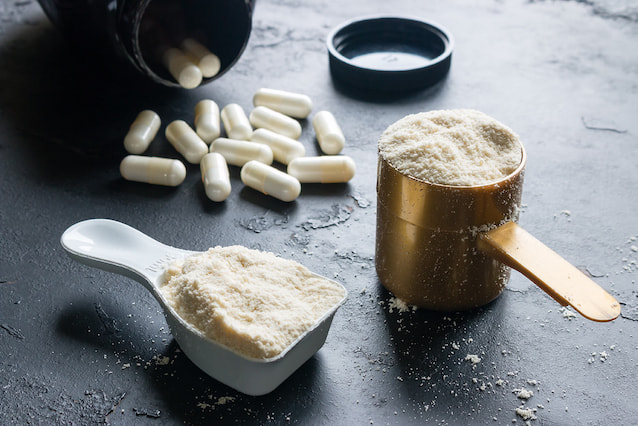The Importance of Including Protein in Your Diet for Overall Health
Protein is made of amino acids that are essential for your overall health and well-being. Your body needs protein to repair, fuel and create cells. Besides that, it is also beneficial for various other reasons, such as muscle growth, hormone regulation and more. That being said, it’s crucial to include an adequate amount of protein in your daily intake. In this guide, we will help you meet your protein needs, explain the advantages of a balanced diet, and give you tips on how to incorporate protein into your meals. Let’s dive right in!

How to Increase Your Protein Intake?
Increasing your protein intake can be achieved through a variety of foods that are naturally rich in protein. These include lean meats like chicken, turkey, and fish, as well as eggs, dairy products like Greek yogurt and cottage cheese, legumes such as beans and lentils, and nuts like almonds and peanuts. However, if dietary restrictions or preferences limit your ability to consume these sources, you can purchase protein supplements that serve as a convenient alternative. Protein powder, shakes, and bars are readily available options that can help you meet your protein goals.
To incorporate protein supplements, you have options. You can choose between types like whey or plant-based. Measure out the suggested serving size and combine it with water, milk, or a beverage you prefer. Opt for shaking or blending until you achieve a smooth texture. For added flavour and nutrition, consider including fruits, nut butter, or oats. You can enjoy your protein shake post-workout or as a satisfying snack. If you have leftovers, you can store them in the fridge.
The amount of protein you need depends on factors like your activity level and goals. For those with a sedentary lifestyle, around 0.8 grams of protein per kilogram of body weight is recommended. If you’re active, aiming for 1.2 to 2.0 grams per kilogram can support muscle repair and growth. Athletes or those with specific goals might need even more, ranging from 1.5 to 2.2 grams per kilogram which you can be achieved by taking pre-workout or post-workout supplements. Remember, these are general guidelines, and it’s wise to consult a healthcare professional or dietitian to determine your specific protein needs.
It’s important to find a balance between whole foods and supplements, tailoring your choices to suit your individual needs and preferences, while always striving for a well-rounded and nourishing diet.

Benefits of a Protein-Rich Diet
Nourishing your body with a well-balanced diet that contains protein is essential for your well-being. Here are the top benefits of a protein-rich diet:
Muscle Maintenance and Growth
Muscle maintenance and growth are the primary advantages of a protein-rich diet. Protein supplies essential amino acids crucial for repairing and building muscle tissues. When you exercise, your muscles undergo micro-tears, and protein aids in their recovery and development, resulting in enhanced muscle strength and size. While protein is vital, a holistic approach including balanced nutrition, hydration, and rest complements this process for optimal muscle health.
Healthy Immune System
A protein-rich diet serves as a key supporter of a healthy immune system. Proteins are crucial for creating antibodies, which are the body’s defence against infections. Adequate protein intake enhances the production and function of immune cells, empowering them to effectively combat harmful invaders.
Moreover, certain amino acids found in protein sources also play a role in immune system regulation, helping to balance immune responses. By incorporating protein-rich foods into your diet, you provide your immune system with the essential building blocks it needs to function optimally, boosting your body’s ability to fight off illnesses and maintain overall well-being.
Hormone Regulation
Proteins have a vital role in hormone regulation by helping create hormones that act as body messengers. These hormones, like insulin and growth hormone, are made from amino acids found in proteins. When you eat protein-rich foods, your body breaks them down into amino acids, which are then used to build hormones. These hormones manage important functions like growth, metabolism, stress response, and reproduction.
Proteins also interact with cell receptors, triggering specific reactions that influence hormone activities. In simpler terms, proteins provide the instructions that help keep your body’s hormones in balance and make sure everything works smoothly.
Appetite Control and Weight Management
A protein-rich diet offers significant benefits for appetite control and weight management. Protein has a unique ability to increase feelings of fullness and satisfaction, which can lead to reduced calorie intake. When you consume protein-rich foods, they take longer to digest and help stabilize blood sugar levels, reducing sudden spikes and crashes in energy that often trigger cravings.
By choosing protein-rich options, you can maintain a sense of fullness and support healthy weight management. Protein’s effects on appetite and metabolism contribute to reduced overeating, making it a valuable tool in achieving and maintaining a balanced weight.
Graceful Aging
Protein-rich foods have a key role in promoting graceful aging. As we age, our bodies undergo various changes, including a natural decline in muscle mass and bone density. Protein is essential for maintaining and repairing tissues, including muscles and bones. Adequate protein intake supports muscle retention and strength, preserving mobility and independence.
Additionally, protein contributes to collagen production, aiding in skin elasticity and joint health. A diet rich in protein can assist in preventing age-related muscle loss and reduce the risk of fractures. By incorporating protein-rich foods, you provide your body with the necessary tools to support vitality and energy as you navigate the journey of aging.

To Sum Up
In conclusion, the significance of incorporating protein into your diet for overall health cannot be overstated. From supporting muscle strength and immune function to aiding in appetite control and graceful aging, the benefits of a protein-rich diet are endless. Protein serves as a fundamental building block that fuels various processes, contributing to a well-balanced lifestyle.
By making conscious choices to include protein-rich foods and incorporate supplements, you empower yourself with the tools needed to enhance your well-being. Remember, the journey toward a healthier you starts with what you nourish your body with, and protein is a vital part of this positive change.



